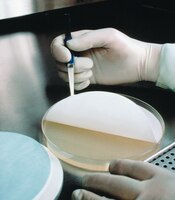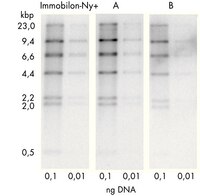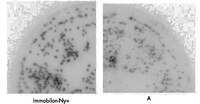Northern und Southern Blotting, Colony und Plaque Lifting
Empfohlene Produkte
Überblick
Spezifikationen
Bestellinformationen
Documentation
Literatur
| Übersicht |
|---|
| ImmobilonTM-Ny+ nucleic acid blotting membrane: An advanced nylon membrane optimized for superior fixation and reprobing Mansfield Michael A(a); Mabuchi Masaharu; MacDonald Constance G; Pluskal Malcolm G Biotechniques v 27 pg 1253-1257 Dec., 1999 1998 |
| Comparison of antigen binding capabilities of various membrane filters and filter papers in dot immunoassay Lin Maw-Yeong(a); Tung Mon-Chu; Sung Haw-Tsung Chinese Journal of Microbiology and Immunology (Taipei) v29 pg 108-115 1996 1996 |
FAQ
| Frage | Antwort |
|---|---|
| What is the Immobilon NY Blotting Membrane? | Immobilon NY membrane is an uncharged 0.45um modified nylon blotting membrane. The membrane was developed specifically for nucleic acid blotting applications, such as Southern and Northern blotting, colony and plaque lifts. |
| How sensitive is the DNA detection on Immobilon-Ny+? | Lambda DNA has been detected down to 0.42 picograms. |
| What is Immobilon-Ny+? | Immobilon-Ny+ is a web-supported, positively charged, hydrophilic nylon blotting membrane. The rated pore size of the membrane is 0.45um. |
| I am using a kit from NE Biolabs kit which recommends the Immobilon S. Since this membrane has been obsoleted, which membrane shall I use? | We have worked with New England Biolabs, and they have evaluated our Immobilon NY+ with their kit. They had excellent results and recommend the Immobilon NY+ as a replacement for Immobilon S. |
| What are the conditions I should use for UV cross-linking DNA to Immobilon-Ny+? | The following guidelines should be observed for successful UV cross-linking to Immobilon-Ny+:
|
| Does it matter what type of water I make up the reagents for Northern and southern blots? | Yes, use Milli-Q water or equivalent water with >18.2 megaohm resistivity should be used to prepare all reagents. Water systems should be well maintained to avoid the build-up of organic contaminants, i.e., pyrogens. Some facts to keep in mind:
|
| What are the advantages of using nylon for performing Southern and Northern blots? | DNA and RNA can be permanently bound to nylon, as opposed to nitrocellulose where the DNA may wash off during hybridization and post-hybridization washes. Nylon is also more durable than nitrocellulose, which makes it well suited for numerous rounds of stripping and reprobing. |
| How do I fix the DNA on Immobilon-Ny+? | For best results, Millipore recommends UV cross-linking at 5000 microJoules/cm2 for blotted DNA and 1700-5000 microJoules/cm2 for filtered DNA. UV energies in excess of the recommended levels will cause a rapid reduction in hybridization signal. The membrane should be dried prior to UV cross-linking. |
| What transfer method should I use with Immobilon-Ny+? | Maximum sensitivity is achieved with capillary transfer in 20X SSC buffer followed by fixation of the DNA by UV cross-linking. While alkaline transfer is compatible with Immobilon-Ny+, the hybridization efficiency is reduced. UV cross-linking has no effect on hybridization of DNA transferred under alkaline conditions. |
| How many times can I strip and reprobe Immobilon-Ny+? | Signal has been clearly observed after 13 rounds of reprobing. |



















